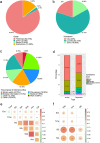Unraveling the impact of cyberporn motivations on mental health: insights from Chinese college students
- PMID: 40420131
- PMCID: PMC12107778
- DOI: 10.1186/s40359-025-02901-y
Unraveling the impact of cyberporn motivations on mental health: insights from Chinese college students
Abstract
Background: Internet pornography use is prevalent among college students, yet the impact of internet pornography consumption on mental health remains contentious, with debates on whether it is positive or negative. This study aims to explore the complex relationship between internet pornography consumption and mental health from the perspective of motives for internet pornography use.
Methods: Using a convenience sampling method, this study surveyed 2,938 college students, collecting data on their demographics, depression, anxiety, sleep quality, social interaction anxiety, and motives for internet pornography use. Descriptive statistics and network analysis methods were employed to investigate the relationship between motives for internet pornography use and mental health among college students.
Results: The results revealed that among college students with motives for internet pornography use, the prevalence rates of depression and anxiety were 55.31% and 36.25%, respectively. Motives for internet pornography use were positively correlated with depression, anxiety, sleep quality, and social interaction anxiety. Network analysis indicated that internet pornography behaviors based on enhancement and coping motives might be associated with increased symptoms of depression and anxiety, whereas behaviors based on social motives might be related to decreased symptoms of depression and anxiety.
Conclusions: This study partially explains the varying impacts of internet pornography consumption on mental health. The findings highlight the importance for policymakers to understand better the potential impact of different motives for internet pornography use on the mental health of college students when regulating internet pornography materials.
Keywords: Anxiety; Cyberpornography use; Depression; Internet pornography use; Mental health.
© 2025. The Author(s).
Conflict of interest statement
Declarations. Ethics approval and consent to participate: This study was conducted in accordance with the ethical principles of the Declaration of Helsinki. All participants received informed consent before filling out the questionnaire. This study used an online questionnaire to collect data, and participants could opt to complete the questionnaire within one week. The study procedure was submitted to the Ethics Committee of the Chongqing Key Laboratory of Psychological Diagnosis and Educational Technology for Children with Special Needs for ethical approval. The submitted materials included the research design, questionnaire content, data collection methods, informed consent forms, participant recruitment procedures, and potential risk assessments. The Ethics Committee evaluated the ethicality, safety, and scientific validity of the study and eventually granted ethics approval (Ethics Number: CSTJ-RE-20230620004). Consent for publication: A comprehensive description of the study was provided to participants, and informed consent was obtained from each participant. Competing interests: The authors declare no competing interests.
Figures



Similar articles
-
The correlation between lifestyle health behaviors, coping style, and mental health during the COVID-19 pandemic among college students: Two rounds of a web-based study.Front Public Health. 2023 Jan 12;10:1031560. doi: 10.3389/fpubh.2022.1031560. eCollection 2022. Front Public Health. 2023. PMID: 36711327 Free PMC article.
-
Mental health, sleep quality, drinking motives, and alcohol-related consequences: a path-analytic model.J Stud Alcohol Drugs. 2013 Nov;74(6):841-51. doi: 10.15288/jsad.2013.74.841. J Stud Alcohol Drugs. 2013. PMID: 24172110 Free PMC article.
-
Geographic Distribution of Mental Health Problems Among Chinese College Students During the COVID-19 Pandemic: Nationwide, Web-Based Survey Study.J Med Internet Res. 2021 Jan 29;23(1):e23126. doi: 10.2196/23126. J Med Internet Res. 2021. PMID: 33439853 Free PMC article.
-
A systematic review of first-generation college students' mental health.J Am Coll Health. 2025 Feb;73(2):519-531. doi: 10.1080/07448481.2023.2225633. Epub 2023 Jul 27. J Am Coll Health. 2025. PMID: 37499142
-
Correlations between mobile phone addiction and anxiety, depression, impulsivity, and poor sleep quality among college students: A systematic review and meta-analysis.J Behav Addict. 2020 Sep 8;9(3):551-571. doi: 10.1556/2006.2020.00057. Print 2020 Oct 12. J Behav Addict. 2020. PMID: 32903205 Free PMC article.
References
-
- Brennan J. Almost looks illegal: family Dick’s Daddy’s little Boy gay pornography series and its Too-Young look. J Homosex. 2022;69:1576–601. - PubMed
-
- Higgins SF, Mulvenna MD, Bond RB, McCartan A, Gallagher S, Quinn D. Multivariate testing confirms the effect of Age-Gender congruence on Click-Through rates from online social network digital advertisements. Cyberpsychol Behav Soc Netw. 2018;21:646–54. - PubMed
-
- Ballester-Arnal R, Castro-Calvo J, García-Barba M, Ruiz-Palomino E, Gil-Llario MD. Problematic and non-problematic engagement in online sexual activities across the lifespan. Comput Hum Behav. 2021;120:106774.
-
- Li D, Zheng L. Relationship quality predicts online sexual activities among Chinese heterosexual men and women in committed relationships. Comput Hum Behav. 2017;70:244–50.
MeSH terms
Grants and funding
LinkOut - more resources
Full Text Sources
Medical

